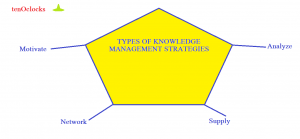Knowledge Management: Knowledge may be a powerful asset that will assist you to grow your business. Effectively capturing and using the knowledge that will be shared with others and assist you to progress. How are you able to use this data to competitive advantage? Read on to find out how sharing knowledge helps you to grow your business.
Develop a Deeper Understanding
One of the simplest ways to become more of an expert at something is to show it. A cornerstone of data management is to teach others on certain topics, which may assist you to develop a deeper understanding of the topic and learn any new or any areas that you’re unsure of. You expand your expertise and answer any questions, which helps you teach yourself while you strengthen your business.
Meet for the aim of data management
Monthly meetings with the whole staff, either company-wide or department-wide, with some set questions, can uncover marketing ideas and competitive strengths that are unique to your business and may create more success. Effective collaboration and communication that encompasses your entire business will give knowledge of the facility to actually grow your business.
Create New Marketing Channels
Knowledge management will uncover each employee’s strengths and unique abilities. Having quite one person creating and taking over marketing activities can help turn your business into a customer-oriented enterprise. Have knowledge sharing meetings recorded by either video or a transcriber so you’re bound to capture all the good ideas. And remember that a mediocre idea, once it gets knowledge sharing added thereto, can become an excellent idea.
Increase Productivity
A deeper understanding of data management can help to streamline productivity and make resource use more efficient. Knowledge is often captured and assembled into a web course that employees can access to find out about the foremost efficient way of doing or using something.
Through knowledge management, a web course offers open access and directions that provide insights into job roles and duties to streamline work processes and management time.
Establish Your Reputation in Your Industry
Knowledge management helps you to determine an industry-wide reputation because it facilitates becoming an ideal leader. While the simplest ideas could also be competitive secrets, many ideas will arise within the meetings which will be became speaking engagements, seminars, eBooks, blogs, and online courses, that raise your business profile. this may position you as an idea leader which can help your business to grow.

TYPES OF KNOWLEDGE MANAGEMENT STRATEGIES
- Motivate: To enable knowledge-related actions, it’s usually necessary to supply incentives and rewards to your targeted users to encourage the specified behaviours. Often, the primary step is going to be a management of change program to align the culture and values of the organization to knowledge management. Setting goals and measurements which individuals and managers must achieve is additionally important. And establishing formal incentives and rewards will reinforce the goals and measurements.
- Network: A fundamental way for knowledge to be shared is through direct contact between people. Connecting to others who can provide assistance or who can enjoy knowledge sharing may be powerful thanks to leveraging each person’s individual knowledge. Communicating across organizational silos allows good ideas to be exchanged between groups who might rather be unaware of every other. Collaborating within communities allows the members to find out together, which is enabled by community events, threaded discussions, and team spaces.
- Supply: There must be a supply of data so as for it to be reused. Supply-side knowledge management includes collecting documents and files, capturing information and work products, and storing these sorts of explicit knowledge in repositories. Tacit knowledge also can be captured and converted to explicit knowledge by recording conversations and presentations, writing down what people do and say, and collecting stories.
- Analyze: Once there’s a supply of captured knowledge, it’s then possible to analyze it in order that it is often applied in useful ways. Before drawing any conclusions from what has been collected, the content should be scoured to verify that it’s valid. Confidential data may have to be scrubbed, or the content may have to be further secured. Lengthy documents may have to be summarized, encapsulated, or condensed.
Also Read :
Top 10 Medicinal Plants You Can Grow In Your Homes
Top 10 Beverages You Should Give A Try
Top 10 Indian Fruits You Should Never Miss
5 Special Sweets On The Occasion Of Ganesh Chaturthi
Sleep and Emotions Definition In Our Life.
